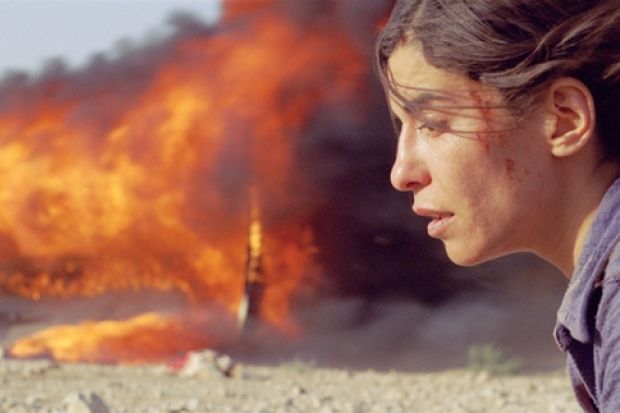Incendies
Directed by Denis Villeneuve
Starring Lubna Azabal, Melissa Desormeaux-Poulin and Maxim Gaudette
Released in the UK on 24 June
"For what can war but endless war still breed?" Film may be the ideal medium for war stories. Fake bomb blasts, flying limbs and shrapnel, and an audience swoons. But those things are intrinsically spectacular, the work of the special effects designer rather than actor, director or writer.
It is harder to realise in visual terms the brutalising effects of war on its victims, although that is usually the subject of more powerful films than those that bring the theatre of conflict to the viewer. I can think of few, for instance, that succeed in dramatising what passes through the mind of a woman when confronted by men with guns in their hands.
Incendies manages to do so and is all the more remarkable for containing only a handful of scenes set on the battlefield. It illustrates the manner in which war takes people over, dictating their fate in ways they cannot control or anticipate. Adapted from a play by Wajdi Mouawad, it betrays its origins in a plot that, were you minded to criticise, is somewhat contrived, dependent on coincidence and teetering on melodrama. But its execution is so accomplished that the film transcends those flaws.
This is partly because its account of war in the Middle East is utterly authentic. Some scenes are so realistic that it is hard to believe they could be other than documentary. And Incendies is at its best when depicting periods of normality in the midst of conflict, in which civilians make journeys on buses or go out to fetch water. It's good, too, on such random menaces as streets full of burning wreckage, empty cars bearing potential threats and the fear roused by casual encounters with soldiers.
Set in Canada in the present, Incendies concerns a pair of twins, Jeanne and Simon Marwan (played by Mélissa Désormeaux-Poulin and Maxim Gaudette), who, on their mother's death, are asked by her lawyer to deliver two letters written by her in her final illness - one to a father they believed to be dead, the other to a brother they didn't know existed. Their search for these missing relatives conducts them on a journey into their mother's past and, to their amazement, they discover her involvement in the wars in the Middle East in the 1970s, including her role in an act of terrible violence and the price she paid for it.
The subject of the film is what war does to people, and how the consequences reverberate over decades. It's probably true that we have less control over our lives than we suppose, but in wartime our autonomy is drastically curtailed. Incendies shows how its characters, trapped in the historical moment, become the playthings of accident - a sniper, a roadblock, an unforeseen encounter with a psychopath. Things, in other words, that exert power over them.
That, I suppose, is the subject of all drama; the point is how well the writer conceives the tension between the will of the individual and outside forces. Denis Villeneuve's adaptation of Mouawad's play works because it explores the psychological depths of its central characters while managing always to understate them. Indeed, the entire emotional temperature of the film is subdued; scenes are shot in cold, dark, washed-out tones, even in the Middle East.
Villeneuve's cast gives sensitive performances all round, especially Lubna Azabal, whose portrayal of Nawal Marwan is focused and credible even when her motives are obscure. Thanks in no small part to her, this is one of the best cinematic adaptations of a play I've seen. Nor could it be said to be stagebound, preferring (like its characters) to be constantly on the move. It is cleverly paced, too, drawing us in after a slow start.
Incendies concludes with an explicit message about the importance of letting go of hatred - being the force that has distorted the lives of its protagonists - as opposed to the togetherness that it commends. But it doesn't need such pieties, which I take to be a vestige of its theatrical origins. The idea that hatred has changed lives for the worse is built into the plot, and implicit in its resolution. That's the only bone I have to pick with this remarkable production.
Of the films I have reviewed this year, Incendies stands out in my mind as among the most memorable. It should not be missed.
Register to continue
Why register?
- Registration is free and only takes a moment
- Once registered, you can read 3 articles a month
- Sign up for our newsletter
Subscribe
Or subscribe for unlimited access to:
- Unlimited access to news, views, insights & reviews
- Digital editions
- Digital access to THE’s university and college rankings analysis
Already registered or a current subscriber?
